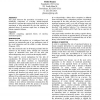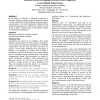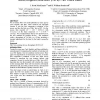1140 search results - page 38 / 228 » human 2003 |
101
Voted
CHI
2003
ACM
15 years 4 months ago
2003
ACM
This paper discusses the association of emotions as an underlying component of everyday human-computer interaction. It presents the ongoing work in the design of an experiment to ...
118
Voted
MLMTA
2003
15 years 1 months ago
2003
This paper argues that genetic programming has not made good on its promise to generate computer programs automatically. It then describes an approach that would allow that promise...
69
Voted
CHI
2003
ACM
16 years 25 days ago
2003
ACM
In this paper, we describe a laboratory experiment to determine whether peripheral awareness information about a remote collaborator's workload aids in timing interruptive co...
102
click to vote
CHI
2003
ACM
16 years 25 days ago
2003
ACM
We present an algorithm for detecting and modeling rhythmic temporal patterns from the record of an individual's computer activity, or online "presence." The model ...
83
Voted
CHI
2003
ACM
16 years 25 days ago
2003
ACM
We revisit the Fitts'law model published 25 years ago by Card, English, and Burr. Their research was important because it was the first comparative evaluation of the mouse, a...



